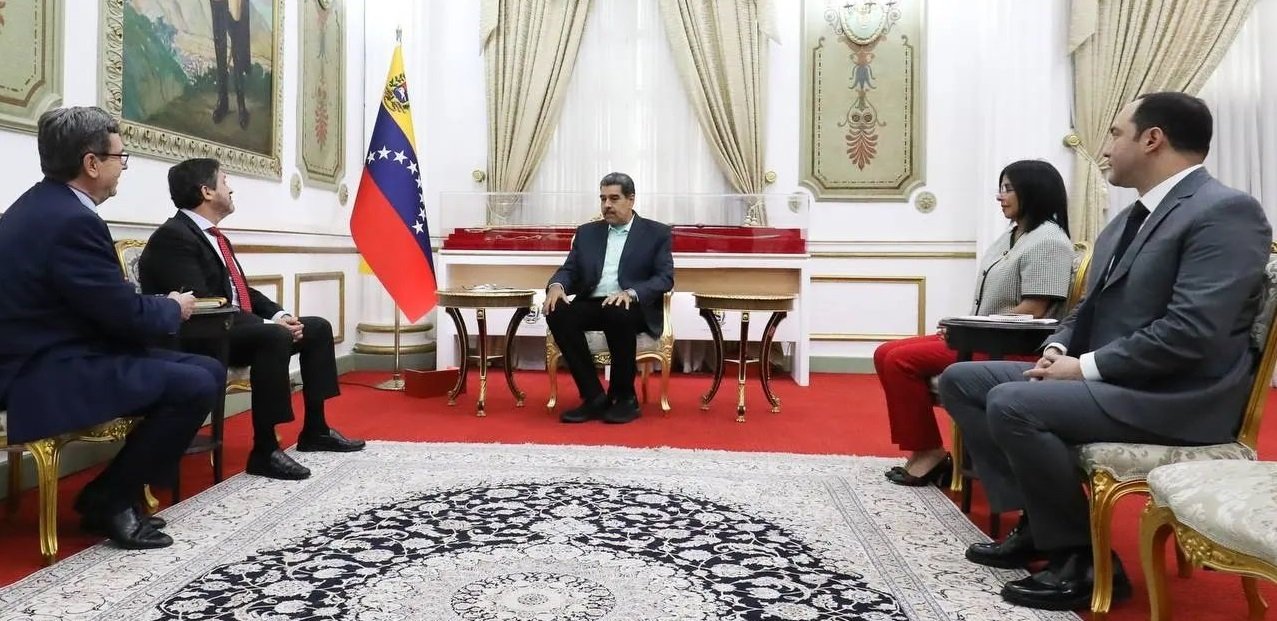Venezuela’s Nicolas Maduro and Delcy Rodriguez meet Repsol, fears that oil output may stagnate
From left to right: Repsol's Venezuela Country Manager Luis Antonio Garcia, and Executive Director of International Exploration and Production José Carlos De Vicente; Venezuela's President Nicolas Maduro, Vice President Delcy Rodriguez, and PDVSA CEO Hector Obregon. The five met in Miraflores Palace on Tuesday, 23 September.
On 23 September, Venezuela’s President Nicolas Maduro and Vice President Delcy Rodriguez held a meeting with Repsol executives, with the backdrop of tense relations between Madrid and Caracas.
The Spanish company was represented by Executive Director of International Exploration and Production José Carlos De Vicente, and Venezuela Country Manager Luis Antonio Garcia.
Vice President Rodriguez, who is also oil minister since August, later met separately with the Spanish executives and PDVSA CEO Hector Obregon. Garcia and Rodriguez had just met on 13 September.
Relations between Spain and Venezuela have strained since opposition candidate Edmundo Gonzalez fled to Madrid. His supporters claim to have proof that he won the 28 July election, and that Maduro rigged the results.
On 11 September, Spain’s Congress approved a motion to recognise Gonzalez as president elect of Venezuela, although President Pedro Sanchez has not followed suit.
In response, Venezuela’s National Assembly approved a motion proposing to cut all ties with Spain, including trade, flights, and consular services, but President Maduro likewise did not accept. Jorge Rodriguez, who heads the legislature and is the vice president’s brother, introduced the motion.
Production may stagnate without new deals
Sources report that Hector Obregon recently called a meeting with the heads of all the joint ventures, to discuss ways to boost output.
Rafael Tellechea, in charge of both the oil ministry and PDVSA from March 2023 to this August, failed to generate growth outside of a handful of joint ventures with foreign corporations.
While such joint ventures have sustained most of the rise in production, they are expected to stabilise once they reach an optimal level. PDVSA is not making new investments, and is instead focusing on attracting foreign capital, but that is also facing obstacles.
Earlier this year, there was a cascade of deals to take over oil fields in Venezuela, while General License 44 was in effect. However, many Western-based companies that signed them are afraid of operating them without a specific license from OFAC, even when they are not based in the US.
There are many other cases where private partners have access to oil fields, but struggle to raise capital to turn them online, due to Venezuela’s high risk levels and US financial sanctions.
BP natural gas project moves forward
A BP ship completed collecting seismic data in the Manakin-Cocuina offshore gas field, which is located between the territorial waters of Venezuela and Trinidad and Tobago. It was previously estimated to have 1 trillion cubic feet of non-associated gas reserves.
This project will still need years before it starts producing, and will involve BP and Trinidad’s National Gas Company, operating in both countries’ waters. Natural gas projects do not require a direct participation by PDVSA, unlike oil where it needs to have a majority stake.
BP was granted a 2-year license by OFAC in May, but has requested 15 years before it makes its $1bn final investment decision.

